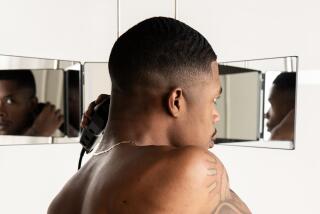
- Share via
- ASMR, short for autonomous sensory meridian response, has ballooned in popularity over the past 15 years.
- Julie Luther, who built a massive YouTube and TikTok following with ASMR videos, offers in-person soft-touch massages at her studio in Pasadena.
I’ve never felt weird about paying strangers to touch me. Massages, facials, martial arts — it’s all just bodywork to me. That is, until I booked my first professional back scratch with Julie Luther, the founder of Soft Touch ASMR Spa in Pasadena.
Something about being touched softly made me nervous. In part, because that’s the kind of physical interaction you expect from your closest companions. I have childhood memories of loved ones tracing patterns on my skin and playing with my hair. Between meetings and mindless scrolling, that kind of touch feels increasingly scarce, almost indulgent, as we grow up in the modern world.
Luther understands this tension well. She’s built a business around re-creating those cozy childhood moments that many find both deeply soothing and surprisingly rare in adult life. Her treatments bring ASMR, short for autonomous sensory meridian response, into the physical world through intentionally gentle touch: back scratches with metal finger extensions, face tracing with feather-tipped wands, and subtle, soothing sounds that come from these careful movements across skin and through hair.

Back in 2007, Luther was stressed out in New York’s cutthroat fashion industry, running on four hours of sleep between a full-time job and internship after graduating college — she found herself craving those same soothing rituals that her mother and grandmother used to help her fall asleep as a child: playing with her hair and scratching her back.
“Nothing has been as relaxing,” she said.
Luther returned to her fashion industry grind. But as she watched ASMR’s popularity grow, she saw potential for the kind of content she’d always wanted to see. When the pandemic hit in 2020, she finally had the time to act, launching Friends with ASMR. She grabbed some friends from her quarantine pod and started filming the gentle back-scratching and hair-brushing videos she always wanted to watch.
Eventually viewers started clamoring for in-person sessions, Luther, whose YouTube channel now has more than 72,000 subscribers, realized she’d scratched her way into an unexpected business opportunity.

The tingling sensation that gives ASMR its reputation — a pleasant, cascading feeling that flows from head to shoulders — only affects about 20% of people, according to Dr. Elizabeth Ko, medical director of the UCLA Health Integrative Medicine Collaborative. But that hasn’t stopped researchers from investigating what happens in the brain during these experiences.
“Research suggests that the brains of people experiencing ASMR see spikes in neural activity in the regions of the brain associated with emotion, reward, empathy and social cognition,” Ko said.
Scientific interest in the practice has grown substantially, with studies suggesting ASMR activities may offer temporary relief for depression and chronic pain in some individuals, according to Ko. When combined with gentle touch like back scratches or hair braiding, Ko said ASMR practices may provide additional benefits through the release of oxytocin, a hormone associated with relaxation and social bonding.
Though researchers are still exploring whether non-ASMR-sensitive individuals can benefit from these practices, Ko notes that “whether ASMR is a physiological oddity or may be a potential therapeutic tool remains to be seen.”

Luther sees this play out in her practice, where she says clients broadly fall into two camps. Most come seeking to re-create comforting childhood experiences of having their hair played with or backs scratched by family members. Some turn to her because they typically find traditional massages painful — something Luther relates to from personal experience. But she also sees clients who have never experienced nurturing touch, including some who are working to rebuild their relationship with physical contact after traumatic experiences.
“They’re trying to relearn what safe touch or nurturing touch is,” Luther said.
Luther’s practice is exclusively for women and nonbinary clients, a boundary she set after a male client ignored her consent forms and asked her to tickle his feet during a session. She has enough clients that it hasn’t hurt business.
Luther works from a serene room she rents from an acupuncturist in downtown Pasadena, with views of the nearby mountains. Luther offers three tiers of service, each named for different amounts of familial comfort: The Best Friend ($75 for 20 minutes), The Sister ($150 for 50 minutes), and The Grandma ($210 for 80 minutes of “Grandma level spoiling”).
I opted for The Best Friend, partly out of journalistic efficiency but mostly from a touch of nerves. All packages include the same elements: back scratching, tracing patterns on arms and face, hair brushing and finger combing, just in different durations. The shorter session felt like a safe way to dip my toe in these nurturing waters.
I stripped down to my underwear and got on a massage table and under the blanket, face down. Luther came in and spoke in a whisper to help set my intention for the session, which was just to relax.


While her YouTube channel features this kind of ASMR whispering throughout most videos, her in-person sessions are different. After the initial whispered guidance, she usually stays silent to let clients focus on their physical sensations. She started with my back using just her regular nails, which was still enough for my muscles to leap under her touch, slightly tickled, almost surprised at the sensation.
Next, Luther’s most popular tools came out: metal rings with pointy tips that extend her fingers into claws. Though my back initially kept tensing at the sharper touch, it soon relaxed into the sensation, as if my body were recalling those childhood back scratches. Next came hair brushing, the spikes of the brush echoing the earlier scratching.
I found myself wondering why I no longer maintain a ritual around brushing my hair. When I do it, it feels like a chore that I rush through, but when Luther did it, it felt like an easy moment of self-care. Finally, she had me flip over for face tracing, which she performed with feathers attached to delicate wands.
Unlike other bodywork treatments I get, there was no so-called “work” involved. No pore extractions or deep tissue pressure that left me breathing through pain. This was just nice, in the purest sense of the word. Pure pleasure, like eating ice cream or sinking into a warm bath. It scratched an itch I didn’t even know I had (pun intended).
When Luther whispered that we were done, I realized my choice of a 20 minute session was a mistake. I was zenned out on that childhood feeling of being cared for, not yet ready to surface and drive myself home.

Speaking to Luther afterward, she laughed knowingly when I admitted my initial hesitancy. The 20-minute session, it turns out, was designed precisely for nervous first-timers like me. More often than not, clients come back for longer the next time or even end up asking to extend their time right from the table.
“A lot of times they’re like, ‘Do you have room to extend the session?’ ” Luther said. “Sometimes I do.”
Next time, I’ll book the Grandma and get 80 minutes worth of niceness. For all the physical improvements that come with a good facial or a massage, sometimes touch for the sake of touch is enough. Our bodies don’t always need work to feel better, they just want to be reminded what it feels like to be cared for.
More to Read
Sign up for The Wild
We’ll help you find the best places to hike, bike and run, as well as the perfect silent spots for meditation and yoga.
You may occasionally receive promotional content from the Los Angeles Times.











